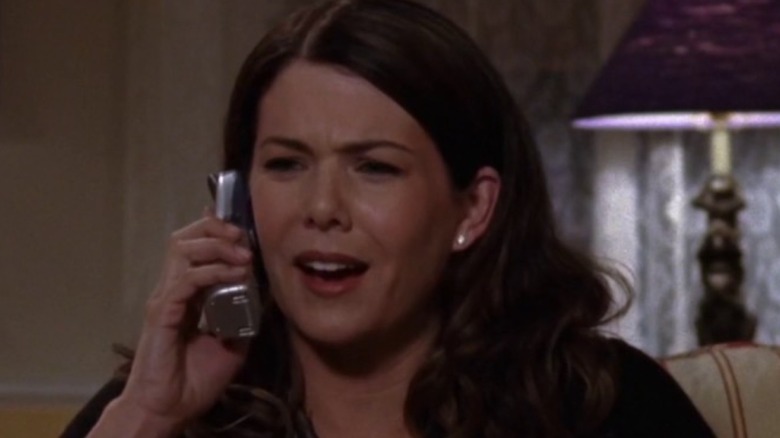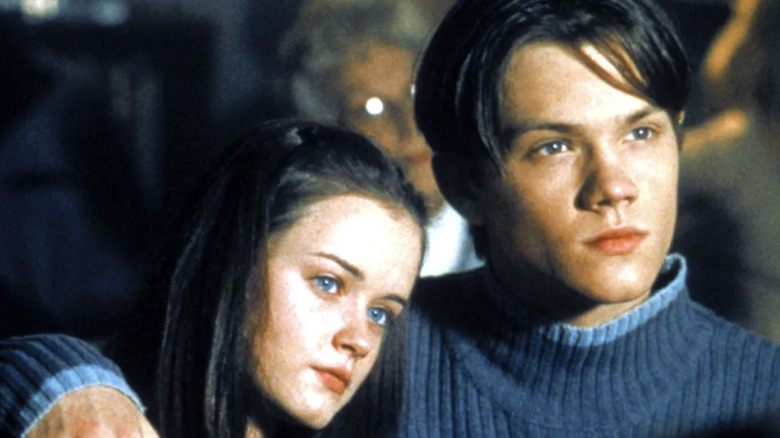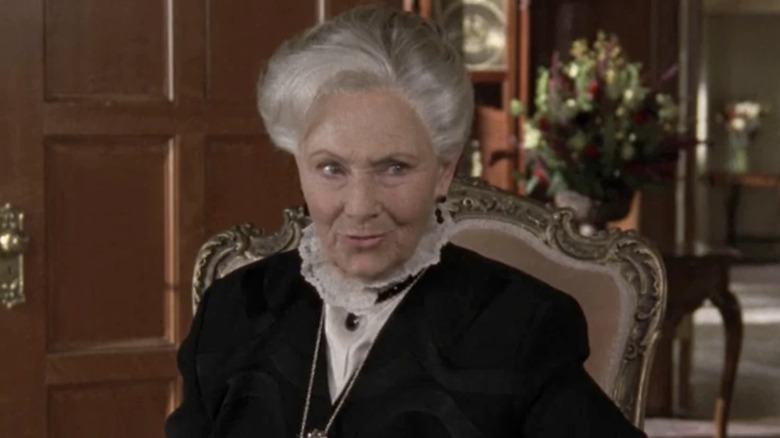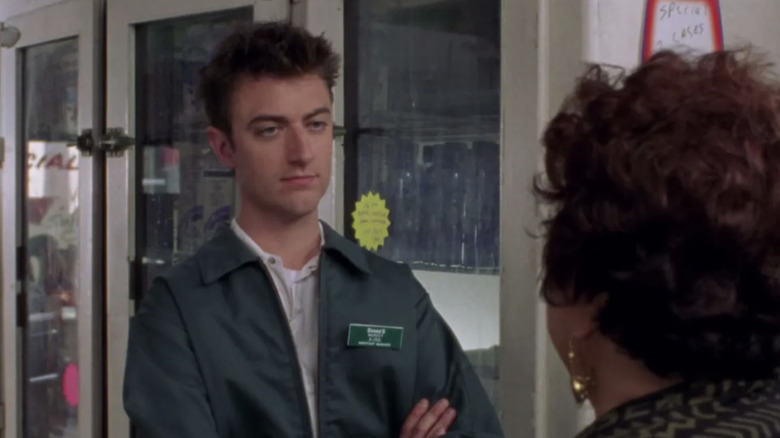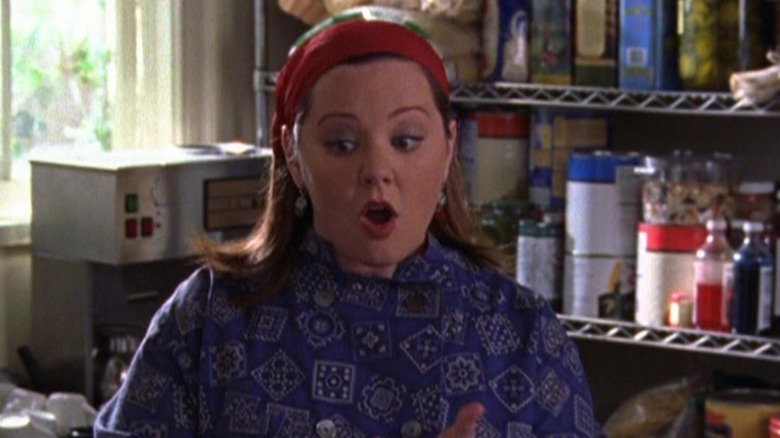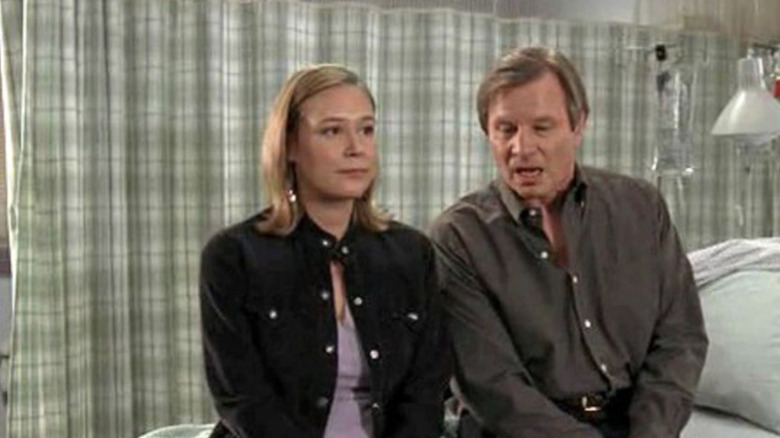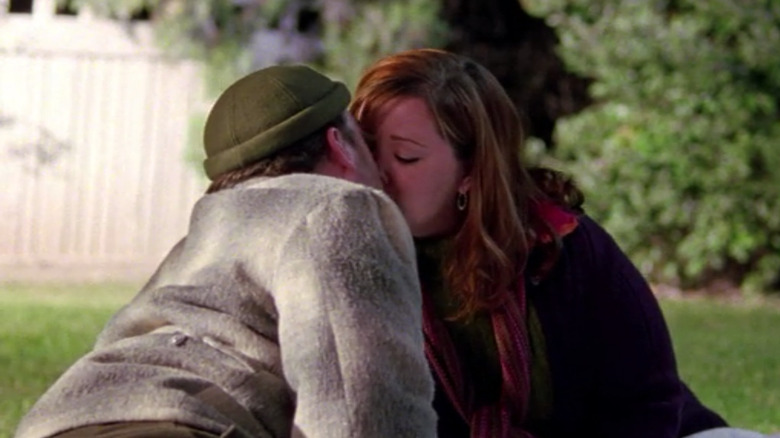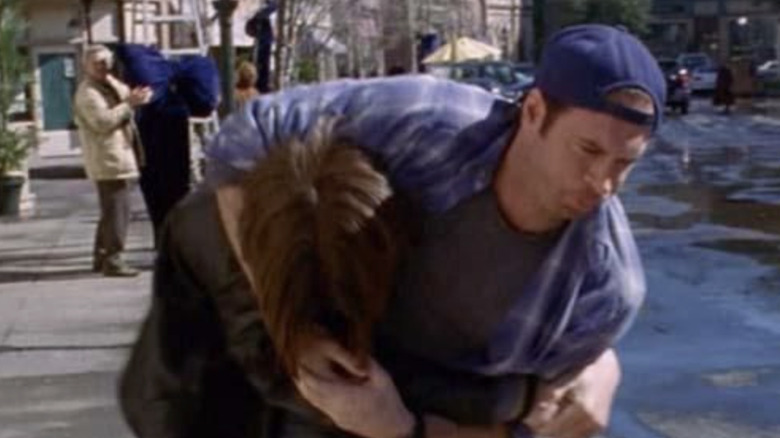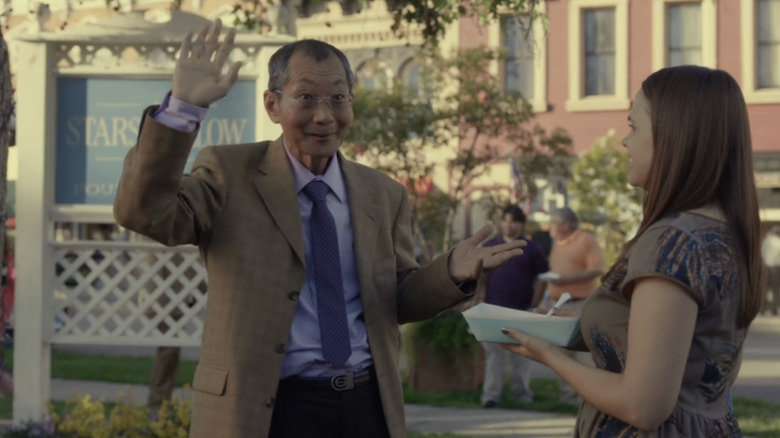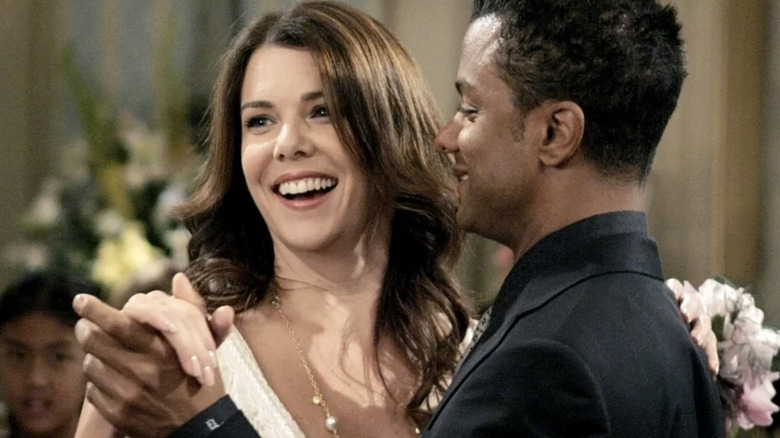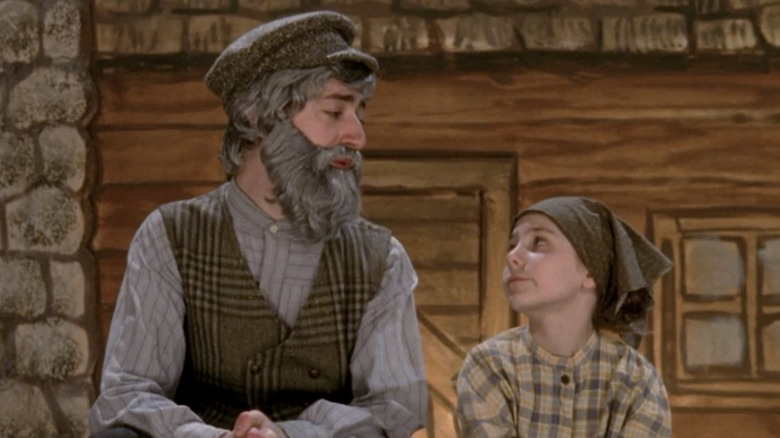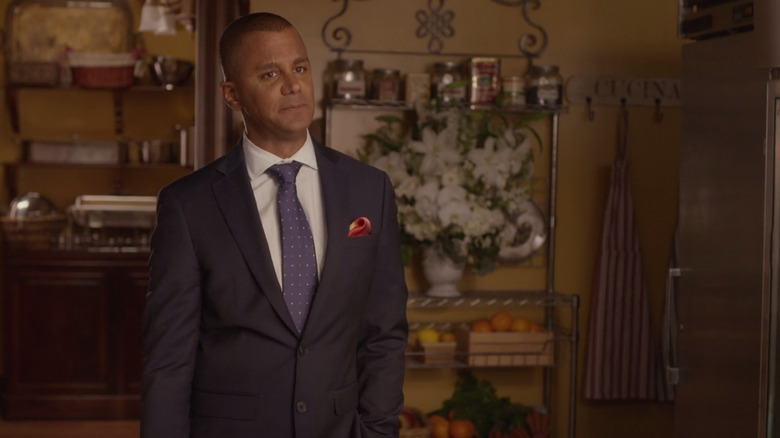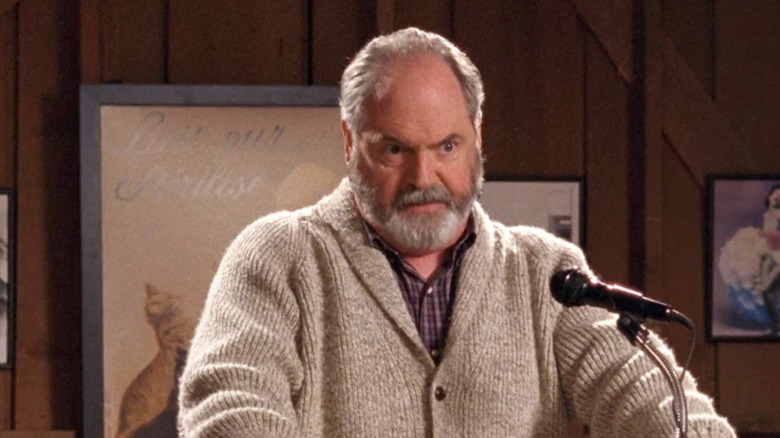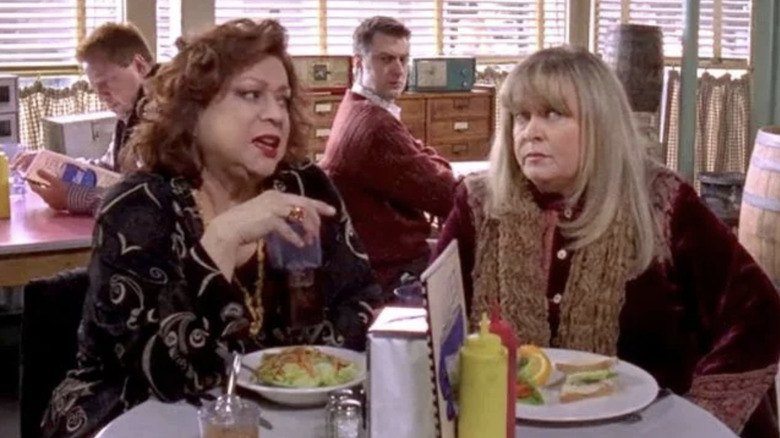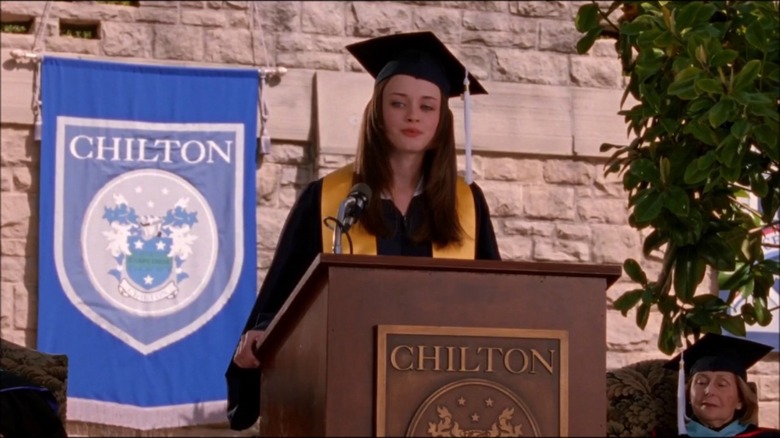Questionable Things We Ignored In Gilmore Girls
"Gilmore Girls" is one of the most beloved shows of the early aughts, and it's not difficult to see why. The family drama has something for everyone: a deeply desirable mother-daughter relationship, a relatably terrible mother-daughter relationship, daddy issues, teen drama, and a single mother who can't quite get a handle on her dating life. No matter where someone is in their life, there's no doubt a "Gilmore Girls" character they can relate to. Even better? The show is wrapped up in a bow of small-town charm with some pointed criticism of privileged lifestyles.
Through the lens of mother-daughter duo Lorelai (Lauren Graham) and Rory (Alexis Bledel) Gilmore, the show manages to be compelling, heartwarming, and captivating, yet there are still many moments that go way too far. Between romanticizing toxic relationships, glamorizing eating disorders, brushing over critical social issues, and failing to offer proper representation for multiple groups, "Gilmore Girls" is both a product of its time — and way behind in many cases. Here are some of the most questionable things about "Gilmore Girls" we all ignored.
Dean is a toxic first boyfriend
It's not uncommon for a young teenage girl to be oblivious about her destructive first relationship. Of course, TV's regular portrayal of toxic relationships may play a part in this phenomenon. In the case of "Gilmore Girls," Rory's mom and the adults around her warp her misconception of healthy relationships deep into adulthood. Between Lorelai's decision to marry Max, a man she clearly doesn't love, and her on-again-off-again relationship with Rory's largely absent father, Rory's mom isn't setting a great example. Yet the entire town of Stars Hollow is smitten with Dean Forester, despite the fact that he is a controlling teenager prone to fits of rage, misplaced blame, and jealous tangents.
When Dean isn't freaking out about Rory's classmate Tristan harassing her, he's turning her emotions against her to use as weapons. Dean's greatest hits include blowing up at her and breaking up with her on their third month anniversary when she's not ready to say "I love you" back. He also constantly pretends to admire her dedication to school while using her busy schedule as ammunition on why she's a terrible girlfriend.
To make matters worse, Dean gets married to Lindsay right out of high school, despite still being in love with Rory. Things come to a head when he cheats on Lindsay with Rory while gaslighting and manipulating both women. But if you ask Dean and the rest of Stars Hollow, he's the best first boyfriend a girl could ask for.
What's the deal with the OG Lorelai?
There's no shortage of continuity issues in the "Gilmore Girls" canon, especially regarding worldbuilding at the beginning of the series. One such plot hole comes from Richard's mother — the original Lorelai — who he lovingly calls "Trix" (which is never explained). In the show's early episodes, Richard uses past tense when he talks about Trix, but later she shows up in the series so that Lorelai's mother Emily can meet her controlling match.
Like the other continuity road bumps in the show, "Gilmore Girls" never addresses the issue, and fans are supposed to pretend it never happened. But it gets weirder. After Lorelai 1.0's death much later in the show, we discover that her husband was, in fact, her second cousin. Not only does this random and unsettling fact offer nothing to the plot, but none of the characters take this discovery in any significant way. Emily and the second Lorelai (Rory's mom) discover some documents prior to Gran's funeral. Why? So that Lorelai can make a few inappropriate jokes to her daughter. Gran certainly serves a plate full of comedic comeuppance for Emily, who gets a taste of her own medicine, but so much of her story could have unraveled in a way that makes sense.
Kirk's confusing origins
In the early days of "Gilmore Girls," Kirk quickly became Stars Hollow's quirkiest resident. He tackled dozens of jobs around town, but the show failed to nail down his character in the pilot, leading to yet another plot hole. We first meet Kirk actor Sean Gunn in the series as a character named Mick who installs DSL in Lorelai's house. Not only is he unknown to Lorelai at this time, he later meets Patty for the first time, with the newly cemented name "Kirk."
Now, writers could have explained the issue with Mick by retconning the character as one of Kirk's referenced brothers that we never see onscreen. Yet his introduction as Kirk to Miss Patty leaves less room for suspension of disbelief. It doesn't take long for the show to establish that Kirk is a Stars Hollow lifer who's been taking dance lessons from Patty since he was a child. Once again, characters could have explained the snag with something ridiculous. Maybe Kirk could have mentioned their meeting and subsequent argument at Doose's Market was a skit once the writers figured out precisely what to do with Gunn's character? It wouldn't be the weirdest thing Stars Hollow residents have done. Yet ignoring Kirk's murky beginnings is a pretty gaping plot hole for one of the series' most iconic characters.
Does Sookie have a pill problem?
Lorelai's best friend Sookie injures herself in nearly every episode of "Gilmore Girls," so it's not surprising that she's had more than a few pain pill prescriptions in her day. However, most people don't keep a dozen pain pill bottles in their purse at any given time. When Lorelai hurts her back before Rory's first high school dance, Sookie whips out the pharmacy's worth of pain killers she has stashed in her bag. Lorelai doesn't bat an eye at the list of pain pill options Sookie spouts off, and it's never addressed again. Yet given Sookie's often erratic behavior, it wouldn't be a stretch that the chef became addicted to pain medication somewhere along her dozens of kitchen mishaps.
Similarly, when Rory has a panic attack during the World War 2 DAR bash later in the show, her frenemy Paris pulls out an arsenal of anxiety meds with no further mention. Can we address addiction just once throughout the show if we're going to have characters casually pull out multiple pill bottles?
If you or anyone you know is struggling with addiction issues, help is available. Visit the Substance Abuse and Mental Health Services Administration website or contact SAMHSA's National Helpline at 1-800-662-HELP (4357).
Romanticizing a power imbalance
"Gilmore Girls" and its propensity to romanticize abusive relationships reaches absurd heights in Season 4 when Paris begins cheating on her boyfriend with her 60-year-old Yale professor Asher Fleming. Granted, Rory is rightfully horrified that Paris is dating someone the age of her grandfather, but the predatory nature of their relationship is barely touched on.
Other students note that Fleming typically picks one young student a year to begin an affair with, but it's framed as romantic that Fleming doesn't ditch Paris at the first opportunity and go after someone younger. Paris even brings him to the hospital at one point, where he gives her an out for their summer plans, but she stays with him anyway — only for Fleming to die on their vacation.
The entire relationship is one cringe moment after another. Still, it's wholly irresponsible to depict a mismatched power dynamic relationship, if you can even call it that, between a professor and student without addressing those issues to a primarily teen audience. These things happen, but shows need to be more meticulous about how they're handled onscreen to combat the negative messages these plotlines send young viewers who may find themselves in a similar situation.
Sookie and Jackson breach bodily autonomy
Hey kids, bodily autonomy is important! "Gilmore Girls" features Sookie and Jackson as one of the show's most stable couples, but even they have a few grave issues that writers fail to address. Jackson proclaims that he wants four children in four years despite Sookie's horror at that notion — and the fact that she would have to be the one endlessly pregnant for four years. Instead of having an honest conversation, the issue never gets resolved.
To make matters worse, Sookie schedules a vasectomy for Jackson after their second child, which is grossly overstepping on her part. However, instead of telling Sookie that he doesn't want one and discussing alternate birth control options, Jackson pretends he went through with it — leading to an unwanted pregnancy later in the series. Both violations are barely broached with a mild conversation. Given that Jackson always wanted more kids, the failed communication seems almost intentional, but this kind of life-altering breach of trust would result in a divorce in many cases.
Additionally, any sex Jackson has with Sookie after she thinks he had a vasectomy is often considered a version of sexual assault called "contraceptive sabotage," per Refinery29. The consent exists when she thinks birth control is in place, but the violation comes from the deception that could lead to an unwanted pregnancy — which it does, in Sookie's case. In 2021, NPR reported that California became the first U.S. state to ban "stealthing" — which is specific to removing contraception during sex — although NBC notes that other laws written to criminalize cases of sexual fraud have failed. Can we do better on and offscreen?
If you or anyone you know has been a victim of sexual assault, help is available. Visit the Rape, Abuse & Incest National Network website or contact RAINN's National Helpline at 1-800-656-HOPE (4673).
The Luke and Dean tussle
Luke may be the only Stars Hollow resident to see Dean Forester as the "punk" that he is, but that doesn't give him the right to a physical altercation with a teenager. Even before knowing the details of Rory and Dean's first breakup, Luke flips out at the 16-year-old teenager. Not only is it incredibly childish behavior, but it's also the assault of a minor, and it only makes things worse for an already heartbroken Rory who's trying to lie low from her overbearing town.
Sure, it's refreshing to see someone see through Dean's charming facade. However, there are better ways to express displeasure at a teenager than getting into a public brawl. The fight could have resulted in Dean's parents filing charges against Luke that would have easily landed him in jail, considering that the event occurred in front of a dozen witnesses in a small town during the day. It's ironic that Luke later gets arrested for beating up a car and not a teenager.
Where's Lane's dad?
Hello continuity issues, we meet again. Rory's best friend Lane faces off against her hyper-religious and controlling mother weekly on "Gilmore Girls," yet her father is nowhere to be found. It would be easy to assume that he died if Lane didn't mention her parents in the plural and present tense throughout the show. Her dad's lack of inclusion almost becomes a self-aware joke throughout the show, but it's frustrating for fans who want answers on where he is, what he does, and why he's absent from all of Lane's major life events.
We never see Lane's dad onscreen until the Netflix revival, where we finally get one answer: He's alive, at the very least. He's shown in "A Year in the Life," where he simply waves during the first town event fans ever see him attend. But outside of that nugget, every question surrounding Lane's largely absent father is never answered. The most damning question? What's his excuse for not attending his own daughter's wedding in the original series? For shame, Mr. Kim.
The OG show queer coded Michel
It's not exactly a surprise that "Gilmore Girls" wouldn't have any concrete LGBTQ+ representation given that its original run took place in the early aughts. However, it was far behind the times compared to like-minded teen-centric dramas like "The O.C." Even "Buffy the Vampire Slayer" had Willow, a member of the core trio, come out in 2001 — a year after "Gilmore Girls" debuted. "Will & Grace" aired even earlier in 1998. Neither show had perfect representation, but it was something.
Fan-favorite "Gilmore Girls" character Michel is queer coded throughout the original series, honing in on fashion, his appearance, and having stereotypically queer hobbies like his obsession with Celine Dion. Yet "Gilmore Girls" leaves his sexuality ambiguous until the revival, where we find out he has a husband — a relationship that occurred entirely offscreen. We don't even get a line where Michel mentions keeping his love life a secret in the past, and we still don't see his husband Frederick onscreen in the revival.
The topic of sexuality is frivolously addressed in other places multiple times in the original show, but never with a main character. Queer coding a character without ever addressing his sexuality is almost worse than having zero representation. Instead of a rounded-out character treated the same as his straight counterparts, Michel became a prop — but even when the show tried to rectify it in "A Year in the Life," Michel's love life is still sidelined. Similarly frustrating, Michel contemplates adopting children that he doesn't want to appease his mysterious husband.
Fiddler never seemed so creepy
Anyone who's ever gone to a third-grade musical performance can attest that elementary school children aren't putting on Tony Award-winning productions — and that's okay because they're children. Yet in Stars Hollow, the local elementary school kids are held to Broadway standards during the school's production of "Fiddler on the Roof." Instead of casting a child as Tevye, Kirk manages to snag the role — as a 30-year-old man. In contrast, a third-grader plays Tevye's wife Golde to make matters creepier. As a result, we have a fully grown man singing love ballads to an elementary school child, and it's about as cringe as you might imagine.
Fans are subjected to an uncomfy iteration of the ballad "Do You Love Me?" that seems unending. As if this horrific match-up couldn't get more bizarre, Kirk's girlfriend is the third-grade teacher, adding a confusing level of romantic nepotism to the mix of an already lawsuit-inducing setup. Is Kirk really so desperate for attention that he needs his girlfriend to steal a role away from a child so he can sing disturbing love ballads to an eight-year-old? Most fans would prefer a Kirk therapy session over whatever this is (and now fans need to seek one out for themselves).
Michel glamorizes eating disorders
Teenagers have a rough enough time navigating the stress and peer pressure in high school to look thin and imitate impossible beauty standards. Anyone who doesn't look like a Hollywood model is often ridiculed, leading to depression and even eating disorders in both the popular and unpopular crowds. High schoolers don't need TV characters further glamorizing diet culture, yet Michel partakes in very serious calorie counting throughout the series.
However, Michel makes statements like, "I only eat 1500 calories a day." Instead of tackling the dangers of eating disorders with this behavior, the characters present it as quirky rather than a real problem. As a result, teenagers watching the show might start partaking in this behavior themselves, adding to an already prevalent issue — especially in the early aughts when the series first aired.
Yet Michel isn't the only character who displays concerning eating habits. Lorelai and Rory frequently binge on endless unhealthy takeout yet manage to stay thin without so much as a workout or a single vegetable. Once again, this gives teenagers watching an unhealthy relationship with food that can lead to behaviors like induced vomiting after meals if they're not getting the same results as Rory and Lorelai — fictional characters who aren't actually eating like this. The show often pokes fun at this Gilmore "quirk" without ever realizing the impact it can have on viewers.
If you are struggling with an eating disorder, or know someone who is, help is available. Visit the National Eating Disorders Association website or contact NEDA's Live Helpline at 1-800-931-2237. You can also receive 24/7 Crisis Support via text (send NEDA to 741-741).
Town Selectman vs. Mayor
Taylor Doose's role in Stars Hollow is another plot device that flops back-and-forth depending on what the story calls for. We meet Stars Hollow's Mayor Porter early on in the series when he runs Town Hall meetings — but writers quickly phased him out of the show. As one of the more entertaining of the town figures, Taylor replaces him at the podium of town meetings, but we never get closure as to where the mayor went. Eventually, we find out that Taylor's actual role is town selectman.
Despite this supposed title, townspeople go back and forth between referencing Taylor as mayor and selectman. Additionally, Jackson wins the selectman title from Taylor when he and the town grow tired of Taylor's strict rules that everyone but himself has to follow. Yet we never see a reelection for selectman or any other role despite Taylor frequently carrying out mayoral duties — and the confused titles. It would be a pretty simple issue to clear up with a throwaway line that the mayor is ill or something along those lines, but we never get clarity on Taylor's status.
The town hens
"Gilmore Girls" may paint Patty and Babette as harmless town hens, but if you analyze their behavior, it becomes more sinister. The gossiping duo frequently sexually harasses the men in town, which is bad enough. Yet they really cross the line when they make lewd remarks about the teenage boys in town. On more than one occasion, they've thrown come-ons and even unwanted touches at Dean while he was still in high school — yet despite having witnessed this predatory behavior, Lorelai and the rest of the town paint it as quirky town charm.
Sexual harassment isn't okay regardless of gender, but if they were men creeping on teenage girls, the end result would likely be much different. Neither situation is appropriate, and someone needs to explain to them that this kind of behavior is unacceptable. The show writes off most of Stars Hollow's creepy behavior as small-town charm, giving viewers a warped reality of how they should act in the real world.
Rory's unrealistic academic merits
One prominent "Gilmore Girls" constant is Rory's continued academic success above her peers, who often put more effort into their studies and extracurriculars. Rory manages to become valedictorian at Chilton after struggling with grades in her new academically challenging environment. Meanwhile, Paris notes that she's never gotten less than an A (we know Rory got at least one D and a B), but Rory somehow lands on top.
Paris fails to score a Harvard acceptance while Rory gets into three Ivy League schools on top of snagging valedictorian. While Paris spends her high school career focused on a consistent GPA and extracurricular path, Rory does very little to garner such a high acceptance rate.
She also drops out of Yale for an extended period and manages to come back and graduate on time, all while being the editor of the Yale Daily News. "Gilmore Girls" previously established that Rory can't handle a large class load, making her timely graduation absurd. Ultimately, she's as stellar of a student as she thinks she is and has everything handed to her while frequently playing the victim card. For teenagers watching, this isn't how academia works unless your parents are bribing the school. Luckily, Rory gets a dose of reality in the revival, where we learn that she fails as a journalist because she easily gives up on leads and doesn't follow through — creating one of the most relatable moments in the "Gilmore Girls" catalog.
